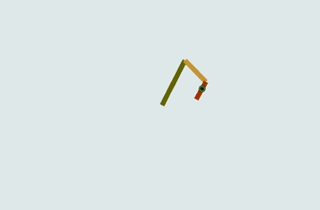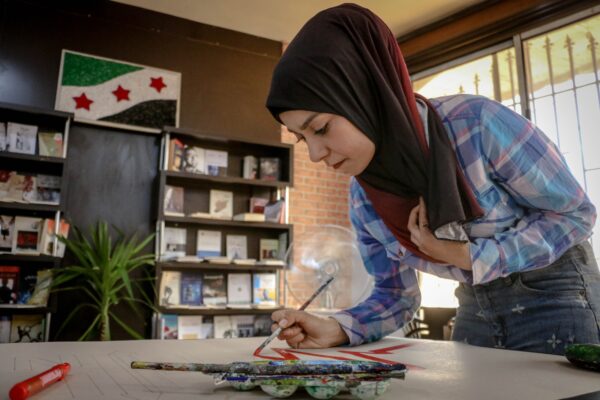(This article by Chris Priestman originally appeared here)
Iranian game maker Mahdi Bahrami is the kind of person who answers a question with more questions. I don’t think he can stop himself. “What will happen if I add a short line to one of the tiles in a mosque?” he asks me. “If we take into account the tiling rules of the mosque, what would the whole wall look like after we add the line? What if we change the rules? What would the mosque ceiling look like?” I don’t know. But for Bahrami, that’s entirely the point—his upcoming puzzle game Engare is about exploring this unknown space and finding the answer.
Engare started out life as a question posed by Bahrami’s high school geometry teacher. This teacher asked the class what shape would be traced by a point attached to a ball if the ball was rolled across a surface (it’d probably be a series of loops). Years later, this same question essentially serves as the concept for Engare, except it asks you to experiment with more than just a ball, becoming more complex as you progress. Each level gives you an incomplete pattern and you have to figure out how to, well, complete it. To do this, you attach a point to one of the objects in the level and then, when you press play, hope that the point’s movement upon that object draws the shape you’re after. If it doesn’t, you rewind, move the point somewhere else, and so on—you can see an early prototype of the game in action here:
It shouldn’t be a surprise that Bahrami’s first love is mathematics. The second is programming. This shows effusively in Engare: a game about using a computer simulation to visualize the answers to mathematical problems. However, the game is also shaped by his native culture, with the patterns that you draw coming to form as beautiful pieces of Islamic art. The leap from the bare bones prototype to it becoming a game about creating art was a small one, given that Islamic art is steeped in mathematical knowledge. That Islamic art bares its mathematical systems so openly and elegantly is something that Bahrami loves. He contrasts it to a lot of figurative art in which you don’t see many mathematical systems at play: “I’m not saying the human body is not an interesting subject. But a human sculpture, for example, doesn’t show us all those interesting systems that form the human body. When we make a game about a guy jumping on platforms, normally we won’t get a lot of interesting answers about the human body.”
The visual flair of Islamic art also helps to further ensure that Engare doesn’t ever feel “dry.” Yes, it’s a game about math, but there are no dull equations to solve. Yet, the same ideas that those equations belong to are approached in Engare, just from a different angle and one that Bahrami reckons can also evoke emotions. “There are geometrical shapes that make us feel happy, patterns that make someone nervous/hypnotized, the tiling of a ceiling can make someone feel lonely” he says. In fact, Engare is closer to the expressive creativity of a drawing tool than the cold numbers of an abacus. This is why, when Bahrami was showing the game to a graphic designer friend of his, he was encouraged to take the puzzles out and let the player explore the art of drawing shapes with the game’s tools freely. Bahrami fully dived into this and has since created a separate drawing tool (among other software) based on Engare that people can use to create original art.

Interestingly, while the connection between the swirling lines of Engare and Islamic artwork and architecture was too strong for Bahrami to turn down, it seems he had some doubts about committing to it. The reason being that Engare is, in fact, Bahrami’s second game based on his cultural heritage. His first was Farsh (2012), a puzzle game that had you rolling out Persian carpets in such a way as to create paths across the levels. As fascinated and appreciative of it as he may be, Bahrami is looking to avoid being pigeonholed as the guy who makes games about Islamic art. Hence his next game after Engare avoids it altogether. Called Tandis, it’s inspired by Celtic shapes, and is a wild and unpredictable experiment in topographical transformation—we had a chance to find out more about it at GDC.
As to Engare, Bahrami is hoping to get it out for PC and mobile this summer. At the moment he’s working on finalizing the iOS version.
You can look out for updates to Engare’s progress over on its new website.





